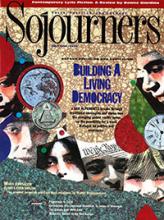Last year Soviet rock star Boris Grebenschikov released an English-language album, produced by Eurythmic Dave Stewart. The album wasn't bad -- a little on the over-blown side, but it had its moments.
When the album was done, like any good servant of commodity culture, Grebenschikov made a video and set out for a promotional tour. One of his stops was on Late Night With David Letterman. There Letterman, in the true spirit of frank intercultural exchange, asked Boris, "What happens to the money you're making from this tour? Do you get to keep it? Can you take it back to Russia, or what?"
Grebenschikov tried to explain that he really wasn't making any money from the concerts. Letterman interrupted and said, to the audience's delight, "Boris, I think somebody forgot to tell you something. You see, over here in America rock stars make really, really big money off of their music." But Grebenschikov, not missing a beat, shot back, "Maybe that's why all of your rock and roll these days is so boring." The audience, and the Dave, shut up in mid-chuckle.
Apparently somebody forgot to tell Letterman that Boris Grebenschikov was nobody's flavor of the month. He was, instead, a grown man who had carried the rock-and-roll flame through two decades of privation and persecution. Somebody forgot to tell Letterman, the very archetype of a cynical Baby Boomer, that there are still people on earth for whom rock and roll stands for -- and is -- something worth fighting for.
Read the Full Article
